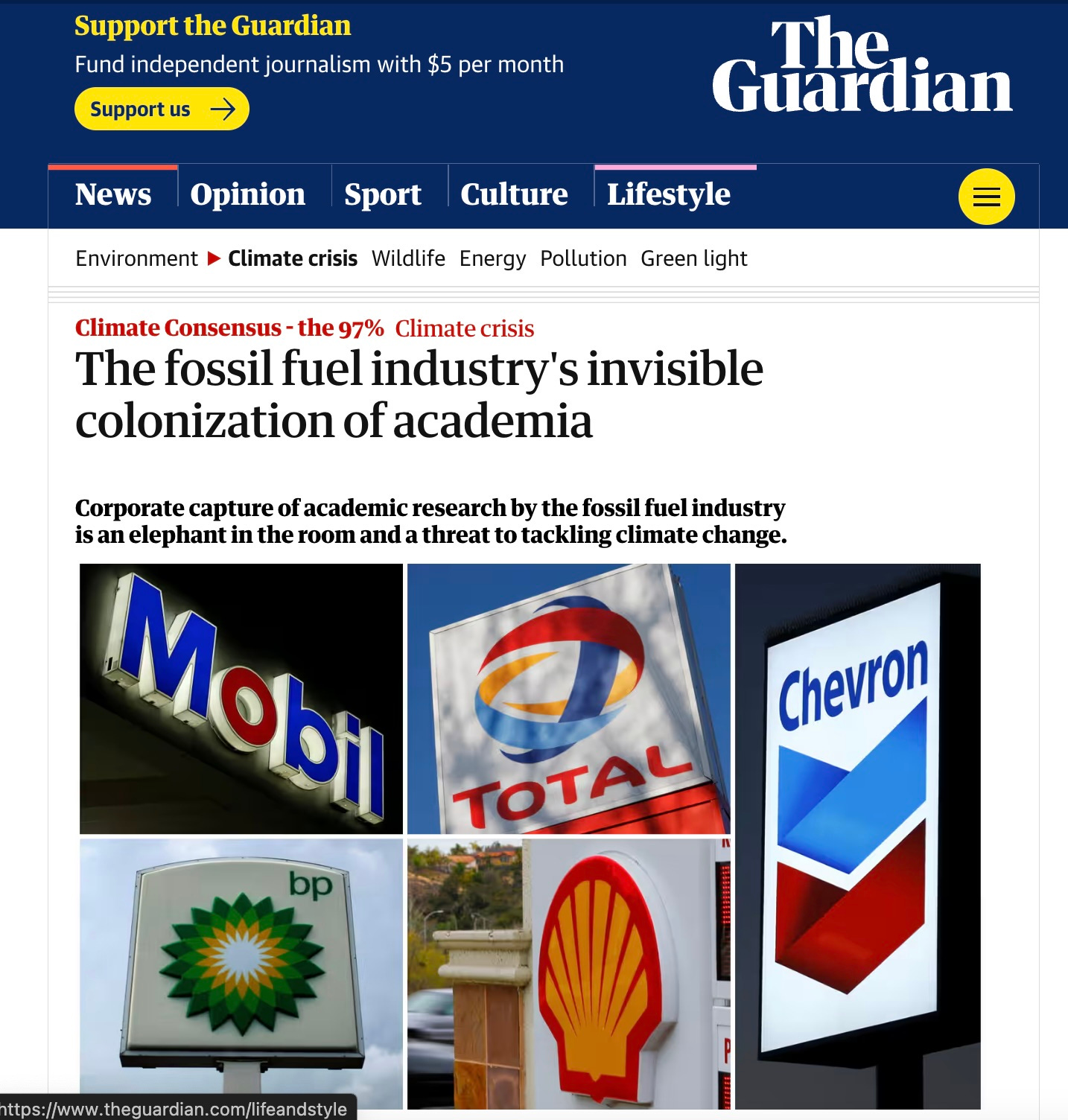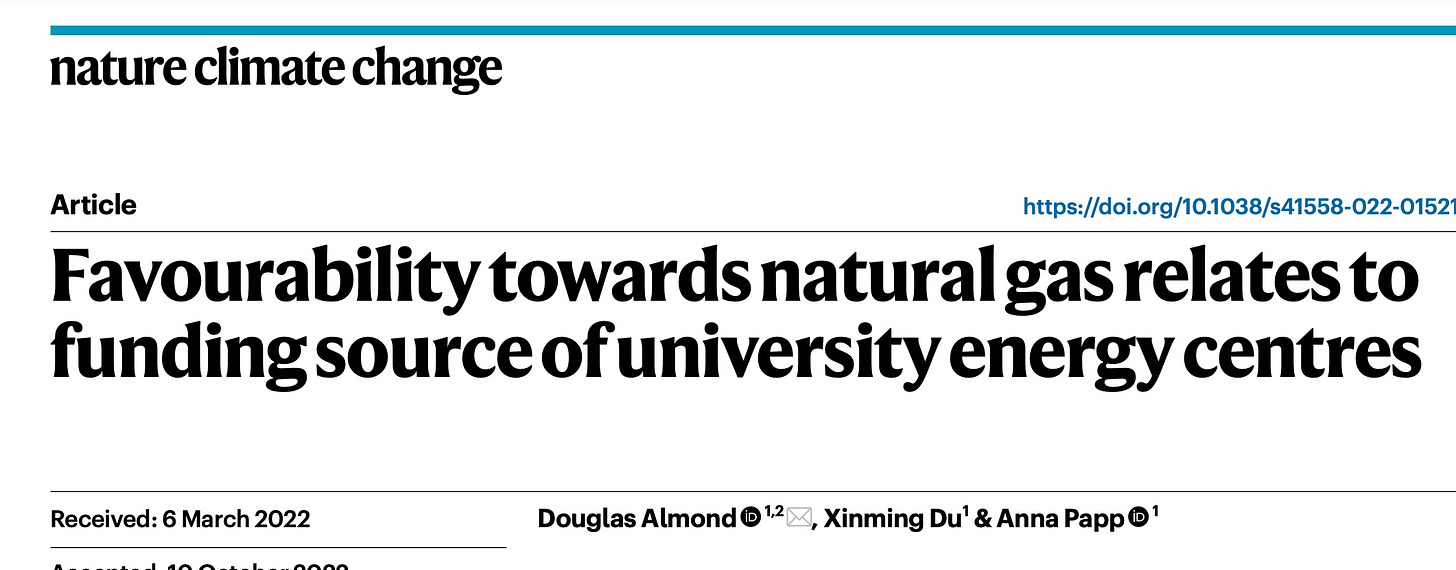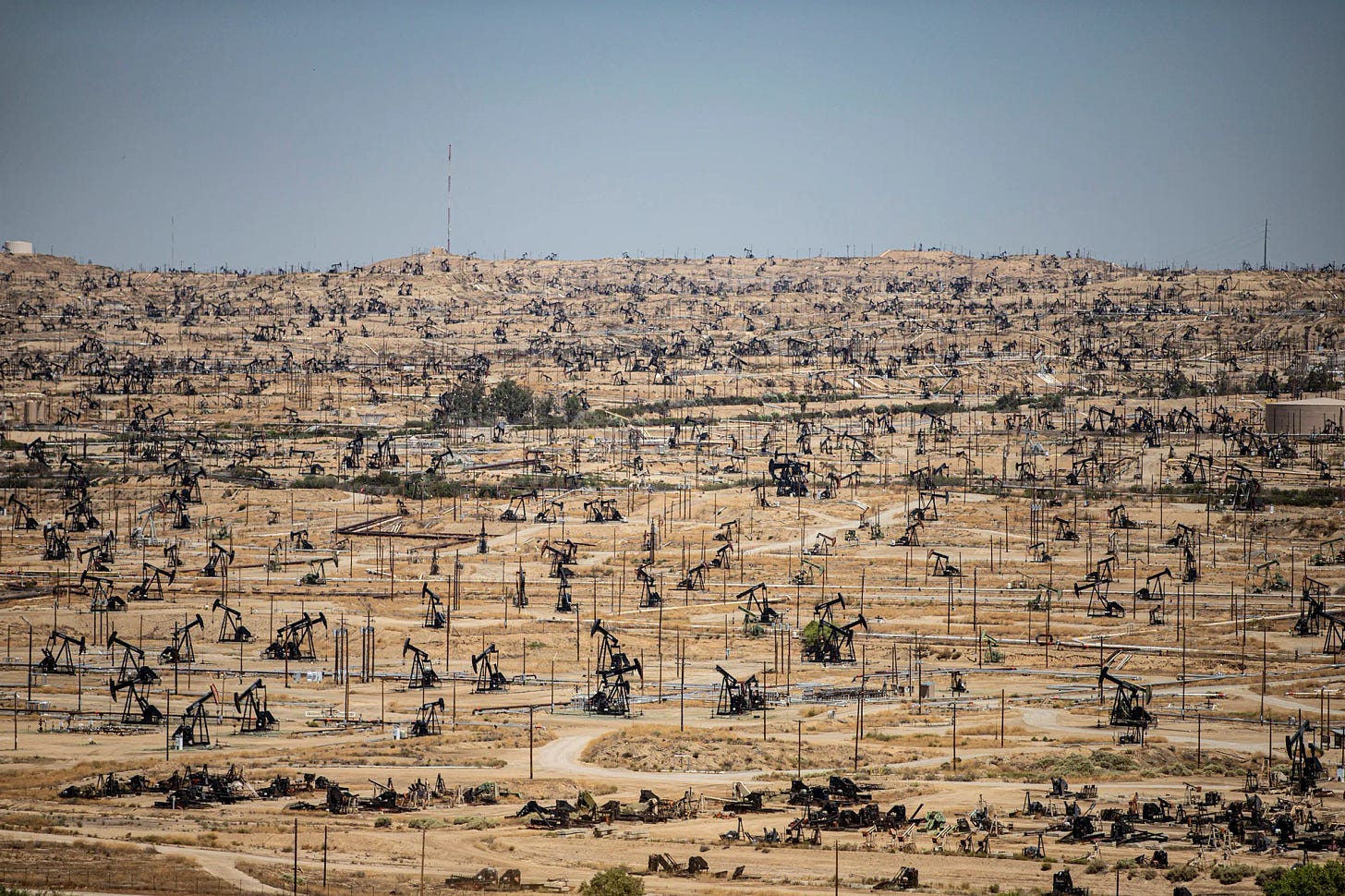When Carbon Cash Comes to Campus
Room for agreement on new fossil funding standards from an array of Stanford grad students - including one funded by Exxon and another studying gas-stove pollution.
UPDATED 📺 I hope you’ll watch this inspiring Sustain What conversation I just had with four current and former Stanford graduate students focused on climate change and energy and trying to change that university’s practices seeking and spending tens of millions of dollars flowing from the fossil fuel industry.
They’ve found a way to work on a common goal across perspectives and disciplines. One is currently working on an Exxon-funded project, another on gas-stove pollution. See details below.
There are four ways to watch and the links are all here - Facebook, LinkedIn and YouTube, plus X/Twitter at @revkin (but there’s no link until showtime).
Carbon cash on campus
For decades, fossil fuel companies have poured hundreds of millions of dollars into university research and programs at Stanford and dozens of other research universities - including Columbia, of course, where I ran my sustainability communication initiative for four years ending in July. (My project was supported by a couple of grants, including from the Schmidt Family Foundation and Heinz Endowment, but no corporate money.)
Needless to say, that flow has engendered intensifying debate as evidence of longstanding fossil industry doublespeak on climate change has accumulated along with evidence for the seriousness of global warming.
For a look before our chat, read this 2023 report from Data for Progress and partners: “The Undue Influence of Fossil Fuel Money in Academia.” Then click back to “The fossil fuel industry's invisible colonization of academia,” a deeply revealing 2017 investigation by academic researchers Benjamin Franta and Geoffrey Supran.
Stanford students press for change
My guests are co-authors of a letter posted last month on the university newspaper website calling for a big shift in how Stanford seeks and accounts for this money. The authors said they hoped to influence Stanford’s Committee on Funding of Energy Research and Education (CFERE) established last December to explore and report “on the issues raised by Stanford’s accepting funding from fossil fuel companies.” No findings have been issued so far.
Here’s the opening of the letter:
We are a group of six graduate researchers with diverse professional backgrounds and opinions on fossil fuel companies’ role in funding affiliate program research. Three of us have been actively protesting fossil fuel funding at the Doerr School. Three of us are in favor of maintaining an open dialogue with fossil fuel companies. We agree that addressing climate change is serious enough to demand a clear strategic response from the University. Working together, we have reached a consensus on recommended criteria for evaluating the sources and objectives of research funding through affiliate programs, as well as a set of actions for enforcing these criteria.
Here are their recommendations for what are called “industry-affiliate programs”:
To take effect immediately: Review, identify and eliminate benefits to industry donors that present a direct conflict of interest. In particular, by enforcing Stanford’s existing policies for industrial affiliate programs.
Dissociate: Eliminate financial sponsorship from any company, trade group or other organization that engages in any of the following (see below for details on each criterion): Does not provide a credible transition plan, does not provide transparent data, has plans to conduct their operations in a manner that is at odds with a Paris-aligned transition pathway.
Establish a third-party enforcement board tasked with: Enforcing existing policies for industrial affiliate programs, including establishing consequences for any violations in line with Stanford’s Code of Conduct, overseeing dissociation and future re-association processes with industry partners on a case-by-case basis. Develop a concrete timeline for the above
Disclose: Strengthen existing disclosure requirements across the University, including by writing specific guidance for conflicts of interest involving the fossil fuel industry.
Establish a transition pathways research initiative: Support the creation of an initiative tasked with evaluating partners’ transition pathways and creating standards for emissions accounting.
My guests were:
Rebecca Grekin - a Ph.D. candidate in energy sciences engineering looking at ways to reduce carbon emissions from the commercial building sector from heating and cooling systems by changing the operations of these systems. She currently is in a program with funding from ExxonMobil.
Yannai Kashtan - a Ph.D. candidate in earth system science, an organizer for the Coalition for a True School of Sustainability and a Knight-Hennessy Scholar. His doctoral research focuses on the health-related hazards of residential fossil-fueled appliances.
Dr. Wennan Long - a recent graduate from the energy science and engineering department at Stanford with expertise in energy engineering and life-cycle assessment. His research interest is building simulators to calculate upstream greenhouse gas emissions across the oil and gas supply chain. Dr. Long led the team on the Archie Initiative to calculate the global oil upstream carbon intensity.
Daly Wettermark - a master’s student in environmental engineering studying operational efficiencies for wastewater treatment and reuse, and a climate activist.
I also encourage you to check out the recent
conversation by with Rebecca Grekin:If you appreciate what I’m trying to do with these dialogues, please consider financially supporting Sustain What. I’m keeping almost everything open free of charge to everyeone. But now that I have no institutional home, it’s just you and me, folks!
Postscript - inserted 11/13/23, 12:45 p.m. - For more on the situation at Columbia University read this Columbia Spectator deep dive on more than half a century of fossil-industry research funding and this 2022 study by three researchers at SIPA, Columbia’s School of International and Public Affairs, reporting a distinctive pattern in communicated report conclusions from industry-funded energy research enters (including at Columbia): Favourability towards natural gas relates to funding source of university energy centres. Here’s the core line from the abstract:
We found that fossil-funded centres are more favourable in their reports towards natural gas than towards renewable energy, and tweets are more favourable when they mention funders by name. Centres less dependent on fossil funding show a reversed pattern with more neutral sentiment towards gas, and favour solar and hydro power.
Here’s a Nature Climate Change commentary on the research: Academia–industry ties under scrutiny.
This kind of analysis is very challenging and I’ll be looking for other expert analysis, particularly from
, a Northeastern University communication and policy professor who’s done vital and largely unsung post-publication “peer review” on a host of such papers. A prime example is his tough critique of a widely covered paper finding that white, wealthy regions were most apt to fend off wind-power projects. - end insertIf you received this dispatch by email, the photo strip at the top is from this sobering photograph of the Kern River Oil Field near Bakersfield, California. Read the related commentary calling for shifting the enormous financial burden of cleaning up old wells to industry from taxpayers.
News fire hose - Head to @revkin on X/Twitter for the latest on the dangerous eruption brewing in Iceland (there are implications for Seattle and many other communities spreading an “expanding bull’s eye” around dangerous volcanoes); learn more about what Karim Khan, the chief prosecutor of the International Criminal Court, calls the “pandemic of inhumanity” spreading from the Israeli/Palestianian catastrophe; explore a fascinating expert debate on the causes and consequences of the failure of nuclear power startup NuScale’s Utah small modular reactor project; and see how the United Arab Emirates, hosts of the COP-28 climate talks, have posted advisories warning reporters not to offend the ruling class or God.









